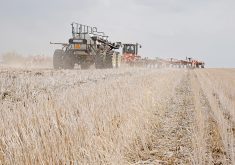As tax season approaches, you are probably asking yourself the question, how can I lower my tax bill? There are many deductions and expenses available to farmers to ensure the best outcome. A few of these deductions will be identified and discussed below.
Home office expense is one such deduction. If your primary workspace is in your home, you can claim utilities, home insurance and interest charges, among other things. You can allocate a percentage based on the number of square feet of your home office. For example, if your home is 1,000 sq. feet and your office is 100 sq. feet, you are eligible to claim 10 percent of the related expenses.
Read Also

Invigor Gold variety viewed as threat to condiment mustard
Invigor Gold, the canola-quality mustard developed by BASF, is on a collision course with Canada’s condiment mustard industry. It’s difficult to see how the two can co-exist.
Farmers can claim expenses related to repairs and maintenance for buildings and fences. This does not include the farmhouse. Another deductible expense is custom work. If you hire subcontractors or have rental equipment costs that relate to earning farm income, you can deduct these.
If you have depreciable property such as buildings, furniture, machinery, or equipment used in farming, you can deduct the cost of the depreciable property through capital cost allowance calculations. When deducting capital cost allowance, you must classify your assets correctly. Each asset class has a different amortization rate, so make sure to ask your adviser if you are unsure of the correct asset classification and depreciation percentage.
Finally, don’t forget that you are required by law to keep receipts relating to farm purchases. Canada Revenue Agency may audit you.
After you have calculated your farming deductions, you might find yourself in a loss position. However, before you can calculate your net farm loss for the year you may have to increase or decrease the loss by certain adjustments, specifically optional or mandatory inventory adjustments. After you have included these adjustments and you still find yourself in a loss position, you may ask yourself, what do I do with this loss?
Farm losses can be fully deductible if you have made your living from farming, and you consider it to be your main source of income. Farming can be your main source of income even if your farm did not show a profit. If farming was your main source of income, you can deduct the full net farm loss.
When determining if farming is your main source of income, you should consider the following factors: gross income, net income, capital invested, cash flow, personal involvement, your farm’s ability to make a profit and finally, your plans to maintain or develop your farm.
If it is determined that yes, farming is your main source of income and you have a net farming loss, you can carry the loss back for up to three years or carry it forward for up to 20 years.
If you determined that farming was not your main source of income, you may be able to deduct only a portion of your net farm loss. To calculate your partial deduction, there are a few factors. For tax years that ended after March 20, 2013, the maximum annual deduction is $17,500.
If your net farm loss is $32,500 or greater, you can deduct $17,500 from other income and the rest is considered a “restricted farm loss.” If your net farm loss is less than $32,500 you can deduct the lesser of your net farm loss for the year, or $2,500 plus 50 percent x (your net farm loss minus $2,500).
I have identified various eligible farm deductions in addition to providing information with regards to farm losses and restricted farm losses. Don’t forget to keep a record of all your deductions and consult an adviser if you find yourself in a loss position.
Colin Miller is a chartered accountant and partner with KPMG’s tax practice in Lethbridge. Contact: colinmiller@kpmg.ca.















